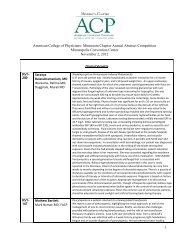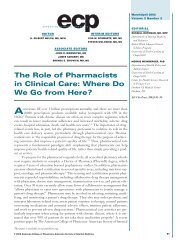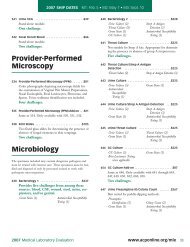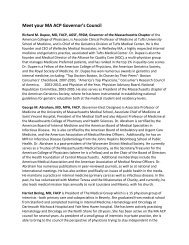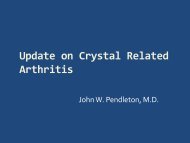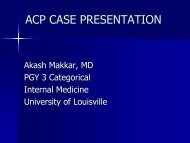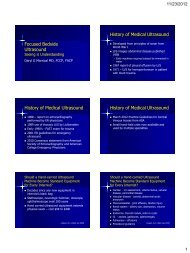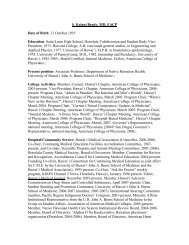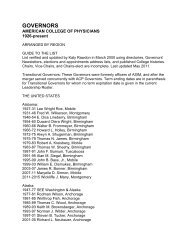A Guide To Gastroesophageal Reflux Disease - American College ...
A Guide To Gastroesophageal Reflux Disease - American College ...
A Guide To Gastroesophageal Reflux Disease - American College ...
You also want an ePaper? Increase the reach of your titles
YUMPU automatically turns print PDFs into web optimized ePapers that Google loves.
A <strong>Guide</strong> <strong>To</strong><br />
<strong>Gastroesophageal</strong> <strong>Reflux</strong> <strong>Disease</strong><br />
[ GERD]<br />
3
Copyright © 2007<br />
AstraZeneca LP<br />
242419<br />
All Rights Reserved<br />
No part of this book may be reproduced or<br />
transmitted in any form or by any means,<br />
electronic or mechanical, including<br />
photocopying or recording, or by any<br />
information storage and retrieval system,<br />
without the written permission of the publisher,<br />
except when permitted by law.<br />
Manufactured in the United States of America<br />
For further information contact:<br />
Conrad & Associates, LLC<br />
10415 Stapleford Hall Drive<br />
Potomac, MD 20854<br />
(800) 553-0504<br />
(301) 983-6417<br />
DISCLAIMER: This guidebook and video program is intended for informational<br />
purposes only, with the understanding that no one should rely upon<br />
this information as the basis for medical decisions. Anyone requiring medical<br />
or other health care should consult a medical or health care professional. Any<br />
actions based on the information provided are entirely the responsibility of the<br />
user and of any medical or other health care professionals who are involved in<br />
such actions.<br />
The sponsor (AstraZeneca LP), the producers (Conrad Productions and Alan<br />
Weiss Productions), the guidebook author (Stephen Braun), the video<br />
scriptwriter (Deborah Gobble), and the partner (<strong>American</strong> <strong>College</strong> of<br />
Physicians) have used reasonable efforts to include timely and accurate<br />
information in this guidebook and DVD. Accordingly, the sponsor, producers,<br />
writers, and partner make no representations or warranties, express or implied,<br />
regarding the accuracy or completeness of the information provided herein<br />
and specifically disclaim any liability, express or implied, in connection<br />
therewith.<br />
Contents<br />
What is <strong>Gastroesophageal</strong> <strong>Reflux</strong> <strong>Disease</strong>? 6<br />
What Causes GERD? 8<br />
What Does Acid <strong>Reflux</strong> Feel Like? 10<br />
What’s the Danger? 11<br />
How Can My Doctor Tell if I Have GERD? 12<br />
What Can I Do to Reduce Acid <strong>Reflux</strong>? 14<br />
Treatments for GERD 15<br />
For More Information 23<br />
5
What is <strong>Gastroesophageal</strong><br />
<strong>Reflux</strong> <strong>Disease</strong>?<br />
When you eat, food travels down the tube (esophagus)<br />
connecting your mouth to your stomach. Your stomach makes<br />
acid that helps break down the food so your body can use it.<br />
The acid normally stays in your stomach where it belongs.<br />
But sometimes the valve at the base of the esophagus, where it<br />
connects to the stomach, doesn’t work right. If the valve<br />
relaxes or opens when it shouldn’t, stomach acid can rise up<br />
into the esophagus, which creates a burning feeling called<br />
“heartburn.” If a large amount of stomach fluid rises up the<br />
esophagus and enters the back of the throat, this is called<br />
regurgitation. Heartburn and regurgitation are the two most<br />
common symptoms of gastroesophageal reflux disease, a<br />
common problem that is better known simply as GERD.<br />
Most people have heartburn or regurgitation once in awhile.<br />
That’s normal. But if you have frequent, persistent heartburn<br />
and regurgitation, acid may be hurting your esophagus. And<br />
the pain or discomfort caused by the heartburn may disrupt<br />
your sleep, work, or general well-being. GERD can be serious<br />
because without treatment it may get worse and could end up<br />
badly damaging your esophagus.<br />
GERD is very common. More than 60 million <strong>American</strong>s<br />
experience heartburn at least once a month and more than 15<br />
million <strong>American</strong>s experience heartburn symptoms every day!<br />
6<br />
Stomach<br />
Here’s the important point:<br />
GERD is a long-term condition that<br />
doesn’t usually go away by itself. It is<br />
a chronic disease. That’s why it’s vital<br />
that you talk with your doctor and, if<br />
a treatment is recommended, that<br />
you stick to the treatment as<br />
prescribed by your doctor.<br />
Esophagus<br />
Valve<br />
Sometimes the<br />
valve at the base<br />
of the esophagus,<br />
where it connects<br />
to the stomach,<br />
doesn’t work right,<br />
allowing stomach<br />
acid to rise up into<br />
the esophagus.<br />
7
What Causes GERD?<br />
In some people, the valve between their esophagus and<br />
stomach is simply weaker than normal for unknown reasons.<br />
Other factors can make the situation worse, such as pressure<br />
on the stomach from tight clothing or extra body fat. Eating<br />
fatty or oily foods causes the stomach to empty more slowly,<br />
which can also make acid reflux more likely. And certain<br />
medications can cause the valve to relax, allowing acid up<br />
into the esophagus.<br />
8<br />
Other factors may make it more likely<br />
you will experience acid reflux:<br />
• Alcohol use<br />
• Smoking<br />
• Pregnancy<br />
Eating certain types of foods also raises<br />
the risk of acid reflux:<br />
• Citrus fruits such as oranges,<br />
grapefruit, or lemons<br />
• Chocolate<br />
• Caffeine-containing drinks such as<br />
coffee or tea<br />
• Fatty and fried foods<br />
• Garlic and onions<br />
• Mint flavorings<br />
• Spicy foods<br />
• <strong>To</strong>mato-based foods,<br />
like spaghetti sauce, chili, and pizza<br />
9
10<br />
What Does Acid <strong>Reflux</strong><br />
Feel Like?<br />
Acid reflux usually begins with a rising, burning<br />
sensation in the chest or throat. Sometimes<br />
with regurgitation, stomach contents rise to<br />
the back of the mouth and you can taste a<br />
sour or bitter flavor. Symptoms most<br />
commonly occur after meals. People<br />
report that symptoms get worse<br />
when they bend over, lie down, or<br />
exert themselves physically.<br />
Be careful!<br />
Sometimes the chest pain<br />
of an impending heart<br />
attack can feel like GERD<br />
or indigestion. If you have<br />
any doubt, call your doctor<br />
or 911 immediately!<br />
What’s the Danger?<br />
If you don’t treat GERD, stomach acid can cause a number<br />
of problems in the lower region of your esophagus. The<br />
lining of the esophagus in this area can become red and<br />
irritated. This is<br />
called esophagitis.<br />
If damage<br />
Esophagus<br />
continues, the<br />
Irritation<br />
lining of the<br />
esophagus can<br />
form erosions<br />
and bleed. Scars<br />
formed when this<br />
type of damage<br />
heals can narrow<br />
the esophagus,<br />
making it hard for food to go all the way down to the<br />
stomach. This feels as if food is getting “stuck” on the way<br />
down. And if the stomach acid repeatedly rises high enough,<br />
you may have a chronic sore throat or voice hoarseness.<br />
Sometimes the lining of the lower esophagus changes<br />
because of the constant irritation. This change is called<br />
Barrett’s esophagus and it may increase your risk for getting<br />
cancer of the esophagus.<br />
11
How Can My Doctor Tell if I<br />
Have GERD?<br />
Unless you have developed complications from GERD such<br />
as difficulty swallowing or bleeding, your doctor may<br />
recommend diet changes, weight loss, quitting smoking,<br />
and/or medication. If this approach works, the diagnosis of<br />
GERD is confirmed. If not, then more tests may be ordered.<br />
If your doctor suspects that your esophagus may be<br />
damaged, it is important to take a look. You will be sent to<br />
see a specialist called a gastroenterologist, who may do a test<br />
called endoscopy. A thin, flexible tube with a tiny lens at the<br />
tip (called an endoscope) is used to look at the inside of the<br />
esophagus. You’ll be given a relaxing medication and asked<br />
to lie on your side. Then the endoscope will be passed<br />
through your mouth, past your throat and down the<br />
esophagus. The doctor will be able to clearly see what your<br />
esophagus looks like and can check for damage that might<br />
signal a risk of cancer. The doctor may also remove a small<br />
sample of tissue to look at with a microscope. This is<br />
painless.<br />
If you have difficulty swallowing, and food seems to be<br />
getting stuck on the way down, your doctor may suggest an<br />
x-ray exam. In this procedure you’ll be asked to swallow a<br />
liquid that clearly shows up on an x-ray. The doctor will<br />
watch as the liquid goes down your esophagus and will be<br />
able to see if there are problems with swallowing, or if there<br />
are any obstructions.<br />
For some patients with typical GERD<br />
symptoms who do not respond to<br />
medication, additional tests are<br />
needed. Two types of tests can be<br />
used to confirm the presence of<br />
GERD. In one method, the<br />
monitor is attached to a thin tube<br />
that passes through your nose<br />
down to the esophagus. The<br />
other method uses a wireless<br />
capsule, placed during<br />
endoscopy, that transmits<br />
results to a recorder.<br />
Unless<br />
you have<br />
developed<br />
complications<br />
from GERD<br />
such as difficulty<br />
swallowing or<br />
bleeding, your doctor<br />
may recommend diet<br />
changes, weight loss,<br />
quitting smoking,<br />
and/or medication.<br />
12 13
What Can I Do to Reduce<br />
Acid <strong>Reflux</strong>?<br />
The old saying “An ounce of prevention is worth a pound of<br />
cure” applies to GERD. Depending on the severity of your<br />
symptoms, you may find that making one or more of the<br />
following changes can bring relief:<br />
• Eat dinner at least three hours before you go to bed.<br />
• Avoid, or eat sparingly, high-fat foods such as cream sauces<br />
and fried foods.<br />
• Avoid the “trigger” foods<br />
listed earlier.<br />
• If you are overweight, try losing<br />
some of those pounds.<br />
• Don’t wear tight-fitting clothing.<br />
• Stop smoking.<br />
• Reduce or stop drinking alcohol.<br />
• Raise the head of your bed<br />
4-6 inches.<br />
When making significant lifestyle changes<br />
such as quitting smoking or losing weight,<br />
you should consult with your doctor.<br />
Also consider enlisting the support<br />
and encouragement of friends and<br />
family members.<br />
14<br />
Treatments for GERD<br />
If lifestyle changes don’t relieve your symptoms and your<br />
doctor suspects or confirms that you have GERD, there are<br />
several possible ways to treat the problem. First, there are<br />
different types of medication:<br />
H2 blockers<br />
H2 blockers reduce the amount of acid that the stomach<br />
makes. This reduction in the amount of acid often prevents<br />
the symptoms of GERD. Several brands of H2 blockers are<br />
available, both by prescription and over-the-counter. H2<br />
blockers are usually taken at least twice a day. They are fairly<br />
inexpensive, readily available, have a long safety record, few<br />
side effects, and usually work well for mild or moderate<br />
cases. However, they don’t work as well as some newer<br />
medications in serious cases. They are also not as good at<br />
promoting actual healing of the esophagus if irritation or<br />
ulcers are present.<br />
Proton-pump inhibitors<br />
Proton-pump inhibitors (PPIs) are medications used to treat<br />
GERD. They stop acid production more completely because<br />
they more effectively block the stomach from making acid.<br />
PPIs are the most effective medicines to heal ulcers and<br />
irritation of the esophagus. Proton pump inhibitors are<br />
usually taken once a day.<br />
15
At the moment, most proton pump inhibitors are only<br />
available by prescription and are more expensive than H2<br />
blockers. One disadvantage is that they don’t work immediately.<br />
Several doses are required for acid to be reduced. Your<br />
doctor may prescribe an over-the-counter antacid or fastacting<br />
medication such as an H2 blocker to use at first.<br />
Surgery<br />
If long-term treatment with medications is undesirable,<br />
surgery to tighten the valve is an option. Note that surgery is<br />
not more effective than medicines and it does not prevent<br />
Barrett’s esophagus. In addition, surgery always has some<br />
risk of complications or unwanted side effects. With the help<br />
of your doctor, you will need to weigh the risks of surgery<br />
against its possible benefits.<br />
16<br />
When You See Your Doctor<br />
<strong>To</strong> get the most out of a doctor’s visit, it helps to be<br />
prepared. Take a pen and a notebook. Consider bringing<br />
along a trusted friend or family member. Here are some<br />
other tips:<br />
• Before your visit, write down all your questions.<br />
• Learn more about acid reflux before your visit<br />
at the library or on the Internet.<br />
• Be as specific as possible when describing<br />
how you feel and what usually occurs<br />
when you feel pain.<br />
• Be persistent if you are confused.<br />
The Key to<br />
Success:<br />
Whatever medication<br />
your doctor prescribes<br />
for you, be sure to<br />
keep taking it as your<br />
doctor directed even<br />
though you may be<br />
feeling better!<br />
GERD usually won’t<br />
disappear…but it may<br />
be successfully<br />
managed.<br />
17
The Good News<br />
18<br />
The pain, discomfort,<br />
and potential harm<br />
caused by GERD can<br />
almost always be avoided<br />
these days. By staying clear of<br />
known “trigger” foods, making<br />
some of the suggested lifestyle<br />
changes, and consistently using<br />
your medications, you can reduce<br />
GERD, and avoid its painful or<br />
uncomfortable symptoms.<br />
Questions to Ask the Doctor<br />
19
GERD-friendly recipes from:<br />
Chef Nathalie Dupree<br />
Author, nine cookbooks (two James Beard Awards)<br />
Host, more than 300 programs for The Food<br />
Network, PBS and The Learning Channel<br />
20<br />
RECIPE<br />
Cream of Carrot<br />
Soup<br />
Serves 6 to 8<br />
2 tablespoons butter<br />
5 to 6 medium carrots, sliced<br />
1 onion, thinly sliced *may be excluded if onion is a trigger<br />
4 cups fresh or canned chicken stock or broth<br />
3/4 cup plain yogurt (optional)<br />
1 1/2 tablespoons sugar, or to taste<br />
Freshly ground white pepper to taste *possible trigger<br />
1 small garlic clove crushed with salt *possible trigger<br />
Finely chopped cilantro, chives, parsley, or thyme (optional)<br />
Melt the butter in a large pot. Add the carrots and onion, cover, and<br />
cook over low heat until soft, but not brown, about 10 minutes. Stir in<br />
the stock, cover, and simmer until the vegetables are very soft, about<br />
30 minutes. Remove the solids with a slotted spoon and puree in<br />
batches in a food processor or blender until very smooth. (You may<br />
need to add a little of the cooking liquid to the food processor.) If you<br />
want a really smooth soup, force the puree through a fine-mesh sieve.<br />
Stir the puree into the cooking liquid and whisk in the yogurt. If serving<br />
hot, bring just to a boil and remove from heat. Season to taste with<br />
sugar, white pepper, and garlic. Pour into a soup tureen or individual<br />
bowls and sprinkle on some chopped herbs.<br />
Serve hot or cold.<br />
RECIPE<br />
Asparagus <strong>To</strong>pped with<br />
Shrimp or Scallops<br />
Serves 4 to 6<br />
The pale green thin asparagus I've seen growing<br />
in Georgia and South Carolina seem the essence of<br />
Southern to me. They bend gracefully with the coastal<br />
winds, and are plucky enough to grow in our sandy soil. They have an<br />
affinity for shrimp and scallops, and are available around the same times<br />
of the year. No acid (lemon juice, vinegar) is needed as the lemon peel<br />
adds enough zing, and the acid changes the color of the asparagus. If you<br />
are fortunate enough to have lemon grass, add it to the asparagus water<br />
before you bring the water to the boil. Remove when the asparagus are<br />
cooked and discard.<br />
2 pounds asparagus, preferably thin<br />
4 tablespoons light olive oil<br />
1 medium onion or 2 or 3 shallots, chopped *possible trigger<br />
1 pound medium peeled uncooked shrimp or scallops<br />
4 tablespoons freshly grated lemon or orange peel (no white attached)<br />
Salt<br />
Freshly ground black pepper *possible trigger<br />
1 tablespoon chopped herbs, preferably fresh<br />
Cut off any woody ends of the asparagus. Peel any thick stalks or<br />
tough skin, beginning at the little offshoots near the tips. Add to a<br />
large pot or frying pan with enough boiling water to cover until just<br />
done and still crisp, about 3 to 5 minutes, drain, rinse in cold water to<br />
stop the cooking and set the color. <strong>To</strong>p with half the grated peel, salt<br />
and pepper and leave at room temperature, or refrigerate if done more<br />
than an hour or two in advance.<br />
If using bay scallops, slice horizontally into 2 or 3 thinner slices. Heat<br />
the 2 tablespoons oil in a large saucepan, add the scallops or shrimp<br />
and cook 1 to 2 minutes, then turn and cook quickly until done. When<br />
ready to serve, arrange some of the room temperature asparagus on<br />
each plate, and top with the seafood, grated peel, oil, salt and pepper<br />
as needed to render flavorful and pretty.<br />
21
Notes<br />
22<br />
For More Information<br />
<strong>To</strong> learn more about GERD and how you can manage it,<br />
contact the following organizations or find them on the Internet:<br />
<strong>American</strong> <strong>College</strong> of Physicians<br />
Philadelphia, PA<br />
www.doctorsforadults.com<br />
<strong>American</strong> <strong>College</strong> of Gastroenterology<br />
Bethesda, MD<br />
301-263-9000<br />
www.acg.gi.org<br />
<strong>American</strong> Gastroenterological Association<br />
Bethesda, MD<br />
301–654–2055<br />
www.gastro.org<br />
International Foundation for Functional<br />
Gastrointestinal Disorders Inc.<br />
Milwaukee, WI<br />
888–964–2001<br />
www.aboutgerd.org<br />
National Digestive <strong>Disease</strong>s Information Clearinghouse<br />
Bethesda, MD<br />
http://digestive.niddk.nih.gov/ddiseases/pubs/gerd/#4<br />
MedlinePlus<br />
http://www.nlm.nih.gov/medlineplus/gerd.html<br />
23
Sponsor<br />
AstraZeneca LP<br />
AstraZeneca is a major international health care business<br />
engaged in the research, development, manufacture, and<br />
marketing of prescription pharmaceuticals and the supply<br />
of health care services. It is one of the world's leading<br />
pharmaceutical companies focusing in gastrointestinal,<br />
cardiovascular, neuroscience, respiratory, oncology, and<br />
infection products.<br />
24<br />
Partner<br />
<strong>American</strong> <strong>College</strong> of Physicians (ACP)<br />
Established in 1915, the <strong>American</strong> <strong>College</strong> of Physicians<br />
(ACP) is the nation’s largest medical specialty organization<br />
and second largest physician group. Its mission is to enhance<br />
the quality and effectiveness of health care by fostering<br />
excellence and professionalism in the practice of medicine.<br />
ACP membership includes about 119,000 members including<br />
medical students. Members are physicians in general internal<br />
medicine and related subspecialties, including cardiology,<br />
gastroenterology, nephrology, endocrinology, hematology,<br />
rheumatology, neurology, pulmonary disease, oncology,<br />
infectious diseases, allergy and immunology, and geriatrics.<br />
Internists treat the majority of adults in the United States.<br />
For more information about<br />
internal medicine physicians,<br />
please visit:<br />
www.doctorsforadults.com.<br />
25
26<br />
Credits<br />
Sponsor<br />
AstraZeneca LP<br />
Partner<br />
<strong>American</strong> <strong>College</strong> of Physicians<br />
Patrick C. Alguire, M.D., F.A.C.P.<br />
Director, Education and Career Development<br />
Contributors to the Video<br />
Harvey Licht, M.D., F.A.C.P.<br />
Associate Professor of Medicine<br />
Division of Gastroenterology<br />
Temple University School of Medicine<br />
Philadelphia, PA<br />
Minhhuyen T. Nguyen, M.D.<br />
Director, Clinical Gastroenterology<br />
Fox Chase Cancer Center<br />
Philadelphia, PA<br />
Project Manager<br />
Carol Brandenburg<br />
Executive Producer<br />
Conrad Productions<br />
<strong>Guide</strong>book Author<br />
Stephen R. Braun<br />
Medical Writer<br />
Amherst, MA<br />
<strong>Guide</strong>book Designer<br />
Cinda Debbink<br />
Design Partners<br />
www.dgdesignpartners.com<br />
Special Thanks to:<br />
Nathalie Dupree<br />
Honorary Doctorate, Johnson and Wales University<br />
Advanced Certificate, Cordon Bleu<br />
Author, nine cookbooks (two James Beard Awards)<br />
Host, more than 300 programs for The Food Network,<br />
PBS and The Learning Channel



